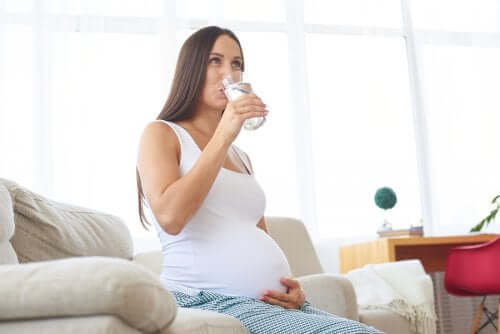6 Signs of Dehydration During Pregnancy


Written and verified by preschool graduate Marisol Rendón Manrique
The signs of dehydration during pregnancy require special attention in order to prevent difficulties in the baby’s development. While this condition is harmful in any stage of a person’s life, it becomes much more dangerous during gestation. Not only do you need enough water for your own body’s needs, but you must also provide your baby with sufficient water as well.
“Humams must receive a regular supply of water. A limited consumption of wataer and an increase in water loss lead to dehydration. A deficiency of just 2 or 3% in the body’s water significantly increases the density of blood plasma. This situation is associated with mortality during gestation.”
– National Institute of Pediatrics –
If you’re experiencing symptoms like nausea, vomiting, and dizziness, then you need to increase your water intake. That way, you’ll avoid the loss of nutrients and uncomfortable conditions, such as the sensation that many pregnant women feel when they stand up.
Last but not least, making sure you get the water you need is extremely important for your baby. Proper hydration helps prevent problems in your baby’s development due to a lack of liquids.
The signs of dehydration during pregnancy
When a woman’s body is lacking proper hydration, it starts to show signs that you must learn to identify. The first of these is feeling an excessively high body temperature.
If your body doesn’t have enough water, it’s difficult to regulate your body heat. This becomes evident through physical signs and symptoms including sweating and the reddening of the face and neck.
Other symptoms are:
- If you notice that your urine is dark in color, this is a big red flag. On the contrary, pee that is light in color is a sign that your body is well-hydrated. What’s more, the frequency with which you need to urinate is another indicator of the fluid level in your body.
- A feeling of dryness in your throat, mouth, and lips. Dehydration also changes the appearance of your skin. It loses a bit of its elasticity and becomes less lush and shiny than usual.

- On a digestive level, there are several issues that are signs of dehydration during pregnancy. Conditions such as constipation, and the appearance of hemorrhoids are both signs to watch out for. The same is true if you experience pain when having a bowel movement and the hardening of stool. These are all common signs that your body needs more water.
- The absence of sweating, even when you’re exposed to high temperatures.
- Issues like dizziness, weakness, and a sense of physical fatigue without considerable physical exertion. This is due to the fact that there’s an abrupt decrease in arterial pressure and the body becomes unbalanced.
- Some women experience Braxton Hicks contractions as a symptom of dehydration. Tension and hardening of the abdominal region are what characterize this muscular reaction. Normally, these contractions last less than 30 seconds. They should be painless and may become more frequent as pregnancy advances.
The causes of dehydration during pregnancy
- Of course, the first cause of dehydration in pregnant women is not taking in enough liquids. That being said, there is no exact amount of water that expecting mothers should drink. Rather, each body has its own particular demands, and it’s important to pay attention to them.
- Difficulty absorbing liquids due to issues like diarrhea and vomiting.
- Kidney failure.
- Problems on a metabolic region that have to do with the assimilation of nutrients.
The consequences of dehydration
The water that a woman’s body stores in her belly helps form the placenta which transports nutrients from her body to her baby’s body. Therefore, when liquids are absent or insufficient, this can make way for the following complications:
- Defects in the development of the baby’s neural tube.
- A reduced amount of amniotic fluid (oligohydramnios).
- Premature onset of labor.
- Deficiencies in the production of breastmilk during lactation.
- The most serious consequence of severe dehydration is shock or the inability of certain organs in the body to carry out their basic functions.

Keep in mind that treating the symptoms of dehydration during pregnancy is crucial. Our bodies use a greater amount of liquid during the gestational period and it’s essential we make up for the liquid that we lose.
It’s also important to remember that excessive eating can also be an issue when it comes to maintaining a stable level of water in our bodies. Keep your eating habits under control and carry out a healthy lifestyle. That way, you and your baby will enjoy good health.
The signs of dehydration during pregnancy require special attention in order to prevent difficulties in the baby’s development. While this condition is harmful in any stage of a person’s life, it becomes much more dangerous during gestation. Not only do you need enough water for your own body’s needs, but you must also provide your baby with sufficient water as well.
“Humams must receive a regular supply of water. A limited consumption of wataer and an increase in water loss lead to dehydration. A deficiency of just 2 or 3% in the body’s water significantly increases the density of blood plasma. This situation is associated with mortality during gestation.”
– National Institute of Pediatrics –
If you’re experiencing symptoms like nausea, vomiting, and dizziness, then you need to increase your water intake. That way, you’ll avoid the loss of nutrients and uncomfortable conditions, such as the sensation that many pregnant women feel when they stand up.
Last but not least, making sure you get the water you need is extremely important for your baby. Proper hydration helps prevent problems in your baby’s development due to a lack of liquids.
The signs of dehydration during pregnancy
When a woman’s body is lacking proper hydration, it starts to show signs that you must learn to identify. The first of these is feeling an excessively high body temperature.
If your body doesn’t have enough water, it’s difficult to regulate your body heat. This becomes evident through physical signs and symptoms including sweating and the reddening of the face and neck.
Other symptoms are:
- If you notice that your urine is dark in color, this is a big red flag. On the contrary, pee that is light in color is a sign that your body is well-hydrated. What’s more, the frequency with which you need to urinate is another indicator of the fluid level in your body.
- A feeling of dryness in your throat, mouth, and lips. Dehydration also changes the appearance of your skin. It loses a bit of its elasticity and becomes less lush and shiny than usual.

- On a digestive level, there are several issues that are signs of dehydration during pregnancy. Conditions such as constipation, and the appearance of hemorrhoids are both signs to watch out for. The same is true if you experience pain when having a bowel movement and the hardening of stool. These are all common signs that your body needs more water.
- The absence of sweating, even when you’re exposed to high temperatures.
- Issues like dizziness, weakness, and a sense of physical fatigue without considerable physical exertion. This is due to the fact that there’s an abrupt decrease in arterial pressure and the body becomes unbalanced.
- Some women experience Braxton Hicks contractions as a symptom of dehydration. Tension and hardening of the abdominal region are what characterize this muscular reaction. Normally, these contractions last less than 30 seconds. They should be painless and may become more frequent as pregnancy advances.
The causes of dehydration during pregnancy
- Of course, the first cause of dehydration in pregnant women is not taking in enough liquids. That being said, there is no exact amount of water that expecting mothers should drink. Rather, each body has its own particular demands, and it’s important to pay attention to them.
- Difficulty absorbing liquids due to issues like diarrhea and vomiting.
- Kidney failure.
- Problems on a metabolic region that have to do with the assimilation of nutrients.
The consequences of dehydration
The water that a woman’s body stores in her belly helps form the placenta which transports nutrients from her body to her baby’s body. Therefore, when liquids are absent or insufficient, this can make way for the following complications:
- Defects in the development of the baby’s neural tube.
- A reduced amount of amniotic fluid (oligohydramnios).
- Premature onset of labor.
- Deficiencies in the production of breastmilk during lactation.
- The most serious consequence of severe dehydration is shock or the inability of certain organs in the body to carry out their basic functions.

Keep in mind that treating the symptoms of dehydration during pregnancy is crucial. Our bodies use a greater amount of liquid during the gestational period and it’s essential we make up for the liquid that we lose.
It’s also important to remember that excessive eating can also be an issue when it comes to maintaining a stable level of water in our bodies. Keep your eating habits under control and carry out a healthy lifestyle. That way, you and your baby will enjoy good health.
All cited sources were thoroughly reviewed by our team to ensure their quality, reliability, currency, and validity. The bibliography of this article was considered reliable and of academic or scientific accuracy.
- González-González A, et al. Síntomas y signos digestivos durante la gestación: náuseas y vómitos/hiperemesis gravídica. Medicina de Familia – SEMERGEN 2011;37(10):559-564. Disponible en: https://www.elsevier.es/es-revista-medicina-familia-semergen-40-articulo-sintomas-signos-digestivos-durante-gestacion-S1138359311002310.
This text is provided for informational purposes only and does not replace consultation with a professional. If in doubt, consult your specialist.








